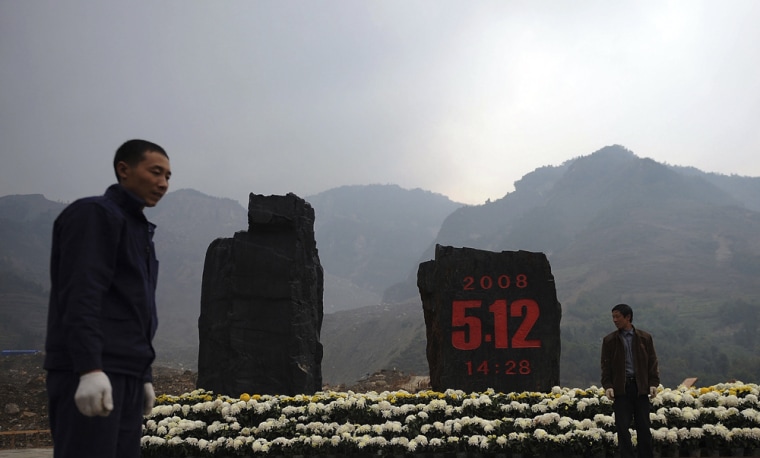Sealed off by guards and a chain-link fence ringed with barbed wire, the moment when an earthquake ripped through this region and destroyed Beichuan remains perfectly preserved.
Only a few orange- and blue-roofed buildings, sandwiched between towering piles of rubble, stand amid the mud and rocks that cover the valley floor.
The town was so shattered by the 7.9-magnitude temblor in Sichuan province on May 12 that the government has decided to abandon it and rebuild. The only question is where.
Six months after the worst quake to hit China in three decades, the future remains uncertain for many survivors. Jobs are hard to come by, and government aid payments are about to end. Many people are still in temporary housing.
The earthquake killed 69,227 people and left 17,923 missing and presumed dead. More than 5 million were left homeless, and China suffered $123 billion in direct economic losses.
Among the hardest hit areas was Beichuan county, a region of small mines and tea plantations whose forested hills were home to 160,000 people. The town of Beichuan saw half its 26,000 residents killed and 70 percent of its buildings destroyed.
'No one should forget'
Along a mountain road overlooking the valley, some survivors have set up stands to sell photos of the town before and after the disaster.
"After the quake, a lot of people came to Beichuan — foreigners and Chinese. On the weekends, hundreds of people come. This is a permanent memory for all people," said 24-year-old Yu Bing.
His display of laminated photos document the first moments of disaster: a huge crack where the road buckled, a fallen woman bleeding, gray dust covering everything.
"No one should forget," he said quietly as he sold a photo for about $1.50 to a visitor from Chengdu, capital of Sichuan province.
On a nearby table are incense sticks and the recording of a Buddhist prayer. A sign urged visitors to light a joss stick and pray for the dead.
No one has been allowed into Beichuan except for residents, who are required to show ID. Government leaders have said Beichuan will become the site of a national monument to victims and an earthquake museum.
Xie Chenyu, a 45-year-old tea grower with ruddy cheeks and braided hair, lost her home when the quake caused a landslide that blocked a river and created a lake. She sells quake photos to tourists, taking in 10-20 yuan ($1.45-$2.90) a day.
"Before, life was easier, I grew tea. We were comfortable," she said. "Now I worry a lot. I have two kids in school and it's a heavy burden. ... I worry when the next quake will come. Whenever there is an aftershock, I feel like I will die."
China's leaders have called reconstruction a priority. Last week, the government announced plans to pump $146 billion into the effort over the next three years. Some 120 billion yuan ($17.5 billion) will be spent on ensuring schools, hospitals and other public facilities are built to higher standards.
Much of the public anger after the disaster came from the collapse of 7,000 classrooms, which experts have said were made with shoddy materials and lacked reinforcements.
Leaders in many cities are weighing where to rebuild. Dujiangyan officials are moving the city center by a few miles because clearing the rubble would take too long.
There are signs of progress. Makeshift tent encampments have largely disappeared, replaced by rows of tidy blue-and-white prefabricated temporary housing.
Along the highway, mounds of bricks, steel and other construction materials are piled up as residents who have the means start rebuilding on their own.
Officials in the city of Mianyang, who are responsible for a region that includes Beichuan, said 620,000 units of temporary housing have been built.
Only 8,000 people remain in tents, but the plan is to get everyone out this month before winter sets in, said Li Dengzhu, deputy chief of the civil affairs bureau. He said the government hopes to start some 450,000 permanent homes by late January.
Survivors have been told they will get subsidies of 20,000 yuan (nearly $3,000) to rebuild homes if they decide to stay.
Searching for a place to rebuild
In Beichuan, local officials are eyeing a location in a nearby county.
Standing on the bank of the Anchang river, He Wang, a deputy county chief of Beichuan, pointed to a vast stretch of low grasslands.
"We looked at many places. This is the ideal place — flat, broad, and no mountains," he said.
Li Xianzhong of the China Academy of Building Research, part of a team sent by the government to assess the earthquake aftermath, said safety is the priority.
"We try to avoid the threat of landslides, mud-rock flows or ... areas too close to quake belts. But the process of deciding on a new location is a hugely complicated one," he said.
For Beichuan's former residents, a reluctance to leave their hometown mingles with fear.
"I grew up here. I want to go back home, but I prefer a safer place. I'm afraid of another earthquake," said 55-year-old Wang Zhencai, who lost his wife and his home.
Li Yunhua, 37, whose home was in the mountains, is ready to move.
"It's very unsafe there. I am afraid to return. How will I make a living up there?" she said.
Her one-room temporary home is filled with remnants of the life she shared with her husband, who died in the quake. A beige sofa, a big TV, and a refrigerator were all salvaged.
"I am worried for myself and my two sons now. I have no high expectations for my life but I want to support them. I would prefer to live near a city," she said.
